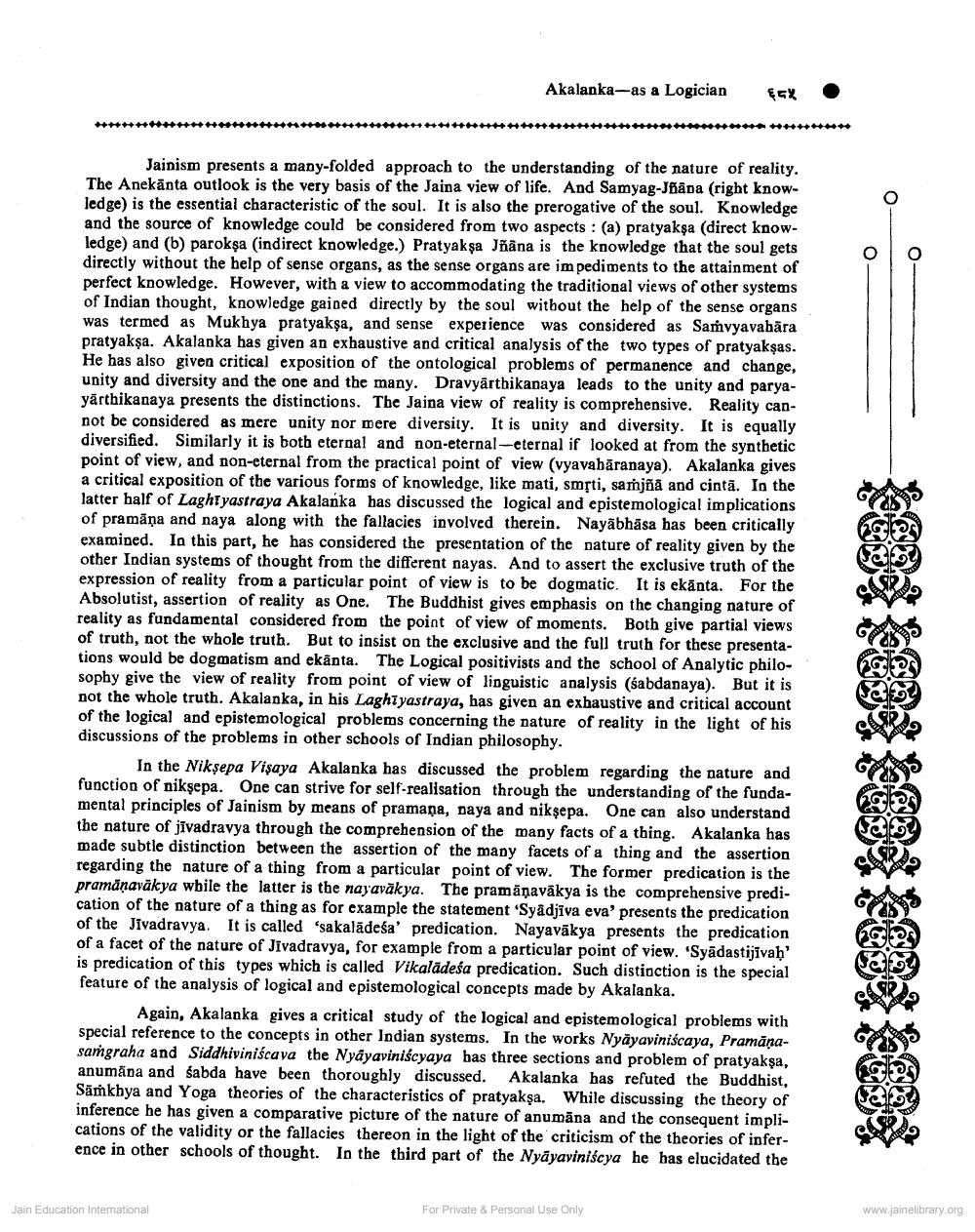________________
+++
Akalanka-as a Logician
Jainism presents a many-folded approach to the understanding of the nature of reality. The Anekanta outlook is the very basis of the Jaina view of life. And Samyag-Jñana (right knowledge) is the essential characteristic of the soul. It is also the prerogative of the soul. Knowledge and the source of knowledge could be considered from two aspects: (a) pratyakşa (direct knowledge) and (b) parokşa (indirect knowledge.) Pratyakşa Jñana is the knowledge that the soul gets directly without the help of sense organs, as the sense organs are impediments to the attainment of perfect knowledge. However, with a view to accommodating the traditional views of other systems of Indian thought, knowledge gained directly by the soul without the help of the sense organs was termed as Mukhya pratyakşa, and sense experience was considered as Samvyavahāra pratyakşa. Akalanka has given an exhaustive and critical analysis of the two types of pratyaksas. He has also given critical exposition of the ontological problems of permanence and change, unity and diversity and the one and the many. Dravyarthikanaya leads to the unity and paryayarthikanaya presents the distinctions. The Jaina view of reality is comprehensive. Reality cannot be considered as mere unity nor mere diversity. It is unity and diversity. It is equally diversified. Similarly it is both eternal and non-eternal-eternal if looked at from the synthetic point of view, and non-eternal from the practical point of view (vyavahāranaya). Akalanka gives a critical exposition of the various forms of knowledge, like mati, smrti, samjñā and cinta. In the latter half of Laghtyastraya Akalanka has discussed the logical and epistemological implications of pramāņa and naya along with the fallacies involved therein. Nayabhasa has been critically examined. In this part, he has considered the presentation of the nature of reality given by the other Indian systems of thought from the different nayas. And to assert the exclusive truth of the expression of reality from a particular point of view is to be dogmatic. It is ekanta. For the Absolutist, assertion of reality as One. The Buddhist gives emphasis on the changing nature of reality as fundamental considered from the point of view of moments. Both give partial views of truth, not the whole truth. But to insist on the exclusive and the full truth for these presentations would be dogmatism and ekanta. The Logical positivists and the school of Analytic philosophy give the view of reality from point of view of linguistic analysis (sabdanaya). But it is not the whole truth. Akalanka, in his Laghiyastraya, has given an exhaustive and critical account of the logical and epistemological problems concerning the nature of reality in the light of his discussions of the problems in other schools of Indian philosophy.
६८५
In the Nikṣepa Vişaya Akalanka has discussed the problem regarding the nature and function of niksepa. One can strive for self-realisation through the understanding of the fundamental principles of Jainism by means of pramana, naya and niksepa. One can also understand the nature of jivadravya through the comprehension of the many facts of a thing. Akalanka has made subtle distinction between the assertion of the many facets of a thing and the assertion regarding the nature of a thing from a particular point of view. The former predication is the pramäṇavakya while the latter is the nayavakya. The pramäņavakya is the comprehensive predication of the nature of a thing as for example the statement 'Syadjiva eva' presents the predication of the Jivadravya. It is called 'sakaladeśa' predication. Nayaväkya presents the predication of a facet of the nature of Jivadravya, for example from a particular point of view. 'Syädastijīvaḥ' is predication of this types which is called Vikalädeśa predication. Such distinction is the special feature of the analysis of logical and epistemological concepts made by Akalanka.
Jain Education International
Again, Akalanka gives a critical study of the logical and epistemological problems with special reference to the concepts in other Indian systems. In the works Nyayaviniścaya, Pramāṇasamgraha and Siddhiviniścava the Nyayaviniścyaya has three sections and problem of pratyaksa, anumana and sabda have been thoroughly discussed. Akalanka has refuted the Buddhist, Sämkhya and Yoga theories of the characteristics of pratyakṣa. While discussing the theory of inference he has given a comparative picture of the nature of anumana and the consequent implications of the validity or the fallacies thereon in the light of the criticism of the theories of inference in other schools of thought. In the third part of the Nyayaviniścya he has elucidated the
For Private & Personal Use Only
O
O
O
www.jainelibrary.org




